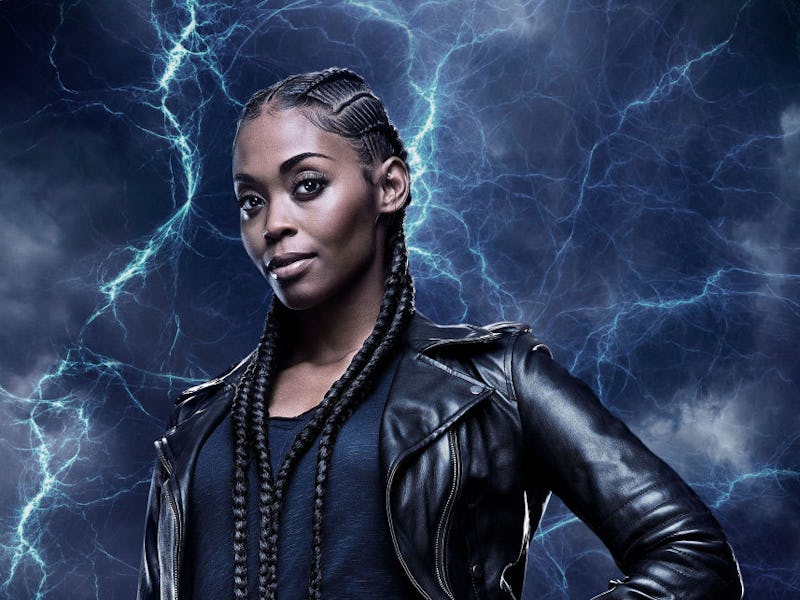With Anissa, 'Black Lightning' Does Something Rarely Seen in Superhero TV

Of all the characters in Black Lightning, Anissa (Nafessa Williams) has easily been the most — excuse the pun — electrifying. While Anissa is refreshingly confident in her queer identity, it’s her superpowers she’s trying to suppress. It’s inevitable that she’ll suit up as Thunder soon, but her first foray into crime-fighting doesn’t go well as well as it usually does for other superheroes.
In one scene, Black Lightning does something extraordinary that most superhero stories often gloss over.
Minor spoilers for Black Lightning ahead.
In this week’s episode, “Black Jesus,” Jefferson Pierce (Cress Williams) continues to juggle between life as a principal and being Black Lightning. It’s getting a lot harder for a middle-aged crimefighter to keep the two lives apart, and this week, a promising student hooked on drugs sold by the One Hundred further erodes what keeps the two egos separate. How often can Jefferson rescue his students as Black Lightning? The answer is, he can’t. Not forever.
But Anissa is having an even harder time than her dad. After rescuing students from drug dealers who push her buttons, Anissa returns that night, posing as a buyer. In other superhero stories, this is where the rookie, still learning to grasp their powers and the responsibilities that come with it, have the thrill of being — well, heroes. It’s like when Spider-Man ditches his wrestling gig to save people instead, or when Clark Kent learns that being faster than a speeding bullet can do more good than make the Smallville High football team.
For Anissa, these drug dealers deserve a beating. They’re selling to kids. One punch to knock them out should inspire them to rethink their life. That’s how it goes, right? Right? Right. But that’s not how it goes.
Elsewhere in "Black Jesus," Lady Eve (Jill Scott) returns, and she's as scary and creepy as she was in her debut last week.
After delivering one seismic haymaker, Anissa realizes how much she still has to learn about her powers. The dealers, who look no older than their early 20s, struggle to breathe after getting clocked by the would-be Thunder. Anissa panics, calls 911, and ditches the scene before help arrives. Eventually, the plot moves on, but it’s this scene that’s stuck with me.
Had Black Lightning stayed with the dealers Anissa hurt, the show would have been extraordinary, maybe even groundbreaking. Instead, Black Lightning* gives viewers just a peek at something most mainstream superhero shows rarely see: Consequences. Painful consequences. And for that, it still deserves recognition.
Rarely in superhero stories, even in comics, are the full weight of a hero’s wreckage felt. Think about the damage Zod leveled on Metropolis in 2013’s Man of Steel: Did any of that feel important? How about in Daredevil, where the Man Without Fear has cleared out two whole hallways of goons in his Netflix show. Are any of them still walking? Did the guy who got hit with the TV monitor suffer irreversible brain damage? Because he probably did.
What happened to the guy who punched Luke Cage’s face and his hand shattered? Can he write his alimony checks anymore?
What about any time a villain kills an underling, to show the audience how evil they are? Like Darth Vader, or Black Lightning’s own Tobias Whale (Krondon). Whenever the underling pleads (“Please, no!”), are they thinking of the families they’re leaving behind? By necessity, Black Lightning doesn’t explore the drug dealers’ families, if any, or anyone who cares for them. But the fact that the show lingered with them in pain, the camera framing them sympathetically as they gasp for oxygen, that’s enough to consider just how many layers remain unexplored in this superhero-dominated era of media.
Honestly, I think about this a lot. A lot more than any TV writer or producer expect anyone to, perhaps, but it’s there. In fictional worlds where bad guys must be bad and good guys have to kill bad guys, people get hurt, whether it’s Batman v Superman: Dawn of Justice or in the Marvel Cinematic Universe. Unexpectedly, it’s Black Lightning that shows just a teeny bit of what someone who has power cannot see the damage they’re really doing.
Black Lightning airs Tuesdays at 9 p.m. Eastern on The CW.